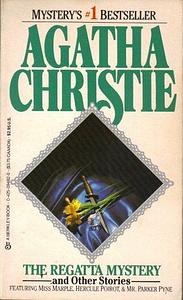Take a photo of a barcode or cover
mysterious
fast-paced
A fun and underrated collection of stories by the queen of mystery herself!
adventurous
mysterious
fast-paced
Plot or Character Driven:
Plot
Strong character development:
No
Loveable characters:
Yes
Diverse cast of characters:
No
Flaws of characters a main focus:
No
I especially liked In the Glass Darkly. Beautiful story..it's actually the shortest of the stories.
adventurous
mysterious
medium-paced
Plot or Character Driven:
Plot
adventurous
dark
mysterious
medium-paced
The Regatta Mystery, read by Hugh Fraser. Story: A Parker Pyne story. short, not the most interesting. Performance: I’ve heard him read Tommy and Tuppence stories, and I know he reads Poirot stories (he played Hastings in the Suchet series), and those were fine, but his performance of some of the characters was odd and uncomfortable; for the Mr. Pointz voice especially, it was unclear what accent he was supposed to have - not obviously English, and it rather sounded like when English speakers attempt vey bad Asian accents. The American accents were at least recognizable if awkward. The Welsh accent sounded nice.
The Mystery of the Baghdad Chest, read by Simon Vance (?). A Poirot story, pretty interesting, and I think I’ve seen an adaptation of it. Poor performance of Poirot’s accent, doesn’t sound anything like French/Belgian, but I’m not sure what it does sound like, except again like Mr. Pointz in the previous story (different narrator) or perhaps Spanish.
How Does Your Garden Grow, read by David Suchet. Performance: delightful - of course Suchet has many years of performing Poirot, but also has a surprisingly deeper neutral narration voice, and the other characters are nicely distinctive.
The Problem at Pollensa Bay, read by Hugh Fraser (?). Another Parker Pyne and unfamiliar. Interesting bit of social commentary though in regards to what young people beach/resort/holiday wear and activities were in the 30s. Doesn’t seem to qualify as a detective story, more social.
Yellow Iris. Read by Hugh Fraser, no Hastings in this story, but he does a good Poirot. Story: this one was familiar from multiple adaptations, including one that I think was a reworked novel length version.
Miss Marple Tells a Story, read by Joan Hickson. Her retelling the solving of a case at which she wasn’t present. Interesting to ompare to Poirot of which I’ve read more. She gives the wandering old lady impression, but also thinks of and notices things in ways others don’t. Similar to the previous story in pointing out how we don’t pay attention to staff.
The Dream, read by Hugh Fraser. No Hastings again, but a young doctor seemed to fill that role. Again seemed familiar from adaptation.
In a Glass Darkly: my audio book expired so the last stories I read from ebooks. I remembered this one from an adaptation in The Agatha Christie Hour, a collection of short stories that weren’t attached to a particular, or any, detective. Very quick but strong story.
Problem at Sea: quick, clever, and neat Poirot story I remembered from an adaptation. I would like to have heard the audio.
The Mystery of the Baghdad Chest, read by Simon Vance (?). A Poirot story, pretty interesting, and I think I’ve seen an adaptation of it. Poor performance of Poirot’s accent, doesn’t sound anything like French/Belgian, but I’m not sure what it does sound like, except again like Mr. Pointz in the previous story (different narrator) or perhaps Spanish.
How Does Your Garden Grow, read by David Suchet. Performance: delightful - of course Suchet has many years of performing Poirot, but also has a surprisingly deeper neutral narration voice, and the other characters are nicely distinctive.
The Problem at Pollensa Bay, read by Hugh Fraser (?). Another Parker Pyne and unfamiliar. Interesting bit of social commentary though in regards to what young people beach/resort/holiday wear and activities were in the 30s. Doesn’t seem to qualify as a detective story, more social.
Yellow Iris. Read by Hugh Fraser, no Hastings in this story, but he does a good Poirot. Story: this one was familiar from multiple adaptations, including one that I think was a reworked novel length version.
Miss Marple Tells a Story, read by Joan Hickson. Her retelling the solving of a case at which she wasn’t present. Interesting to ompare to Poirot of which I’ve read more. She gives the wandering old lady impression, but also thinks of and notices things in ways others don’t. Similar to the previous story in pointing out how we don’t pay attention to staff.
The Dream, read by Hugh Fraser. No Hastings again, but a young doctor seemed to fill that role. Again seemed familiar from adaptation.
In a Glass Darkly: my audio book expired so the last stories I read from ebooks. I remembered this one from an adaptation in The Agatha Christie Hour, a collection of short stories that weren’t attached to a particular, or any, detective. Very quick but strong story.
Problem at Sea: quick, clever, and neat Poirot story I remembered from an adaptation. I would like to have heard the audio.
I just don't think short stories are the best medium for Christie's mysteries. Doesn't give the reader enough time to ponder the story and unravel the mystery, and constrains the details of the plot - often to the point of not mentioning key details until The Reveal.
Still, I was glad quite a few of these got expanded upon and delighted with the Marple short story. The first person point of view felt thoroughly charming. Little old ladies sure do love to tell detailed stories.
adventurous
mysterious
medium-paced
adventurous
challenging
dark
mysterious
tense
fast-paced
Plot or Character Driven:
Plot
Strong character development:
No
Loveable characters:
Yes
Diverse cast of characters:
No
Flaws of characters a main focus:
No
A diverse collection of nine short story mysteries solved by two of Agatha Christie's most loved detectives (Hercule Poirot and Miss Marple) and the lesser known detective Mr Parker Pyne.
All stories had that classic Christie twist with the villain being someone or some way you'd never consider, despite the evidence. However, they're really bare bones and could have done with some padding in expanding characters and setting the scene more to slow down the pace.
1. The Regatta Mystery (Pyne)- 3 stars
A childish wager to steal a priceless jewel leads to it's open theft, but not by who you'd think. While the chain of events during the theft were wonderful to follow, all the detective work was behind the scenes so made for a dull ending.
2. The Mystery of the Baghdad Chest (Poirot)- 4 stars
A murdered husband in a wooden chest with only one clear suspect, but not according to Poirot. The 1991 David Suchet TV episode had a slightly more fantastical and believable modus operandi, but nonetheless this was still very entertaining.
3. How Does Your Garden Grow (Poirot)- 3 stars
An urgent letter arrives too late for Poirot to save an elderly woman, who instead must solve her murder.
Disappointingly, Poirot stumbles upon the solution rather than his "little grey cells" being of any importance.
4. Problem at Pollensa Bay (Payne)- 2 stars
A holidaying detective gets caught up in the personal lives of other travellers.
I waited until the very end for the mystery to start, only to find out this story focused on interpersonal relationships, which was uninteresting.
5. Yellow Iris (Poirot)- 2 stars
Poirot follows a mysterious call to a table with yellow irises and a group of curiously tangled people.
Things were concealed for far too long and it felt like this mystery never really started. The 1993 David Suchet TV episode was much more engaging.
6. Miss Marple Tells a Story (Marple)- 2 stars
The husband suspected in his wife's murder looks to Miss Marple for her help in solving this locked-door mystery.
These kinds of stories truly need a map and red string evidence boards to keep track of the convoluted way evidence is given. Miss Marple is still growing as a character, but currently pigeonholed as an old nosy biddy.
7. The Dream (Poirot)- 3 stars
A man is found dead days after confiding in Poirot of a recurring suicide dream, but is it suicide or murder?
This is one of the more obvious mysteries as only one answer seemed possible, but still was an interesting read. The 1989 David Suchet TV episode extends this out and gives it a more mysterious feel.
8. In a Glass Darkly (SciFi standalone)- 1 star
A man sees an apparition and it marks the course of his life.
I didn't realise this wasn't a mystery, and waited and waited for them to investigate the supernatural occurrence. Bitterly disappointing.
9. Problem at Sea (Poirot)- 4 stars
The locked-room murder in a cruise ship of a horrible woman where everyone has an alibi.
This was cleverly written and cleverly solved, with a somewhat unsatisfying ending.
All stories had that classic Christie twist with the villain being someone or some way you'd never consider, despite the evidence. However, they're really bare bones and could have done with some padding in expanding characters and setting the scene more to slow down the pace.
1. The Regatta Mystery (Pyne)- 3 stars
A childish wager to steal a priceless jewel leads to it's open theft, but not by who you'd think. While the chain of events during the theft were wonderful to follow, all the detective work was behind the scenes so made for a dull ending.
2. The Mystery of the Baghdad Chest (Poirot)- 4 stars
A murdered husband in a wooden chest with only one clear suspect, but not according to Poirot. The 1991 David Suchet TV episode had a slightly more fantastical and believable modus operandi, but nonetheless this was still very entertaining.
3. How Does Your Garden Grow (Poirot)- 3 stars
An urgent letter arrives too late for Poirot to save an elderly woman, who instead must solve her murder.
Disappointingly, Poirot stumbles upon the solution rather than his "little grey cells" being of any importance.
4. Problem at Pollensa Bay (Payne)- 2 stars
A holidaying detective gets caught up in the personal lives of other travellers.
I waited until the very end for the mystery to start, only to find out this story focused on interpersonal relationships, which was uninteresting.
5. Yellow Iris (Poirot)- 2 stars
Poirot follows a mysterious call to a table with yellow irises and a group of curiously tangled people.
Things were concealed for far too long and it felt like this mystery never really started. The 1993 David Suchet TV episode was much more engaging.
6. Miss Marple Tells a Story (Marple)- 2 stars
The husband suspected in his wife's murder looks to Miss Marple for her help in solving this locked-door mystery.
These kinds of stories truly need a map and red string evidence boards to keep track of the convoluted way evidence is given. Miss Marple is still growing as a character, but currently pigeonholed as an old nosy biddy.
7. The Dream (Poirot)- 3 stars
A man is found dead days after confiding in Poirot of a recurring suicide dream, but is it suicide or murder?
This is one of the more obvious mysteries as only one answer seemed possible, but still was an interesting read. The 1989 David Suchet TV episode extends this out and gives it a more mysterious feel.
8. In a Glass Darkly (SciFi standalone)- 1 star
A man sees an apparition and it marks the course of his life.
I didn't realise this wasn't a mystery, and waited and waited for them to investigate the supernatural occurrence. Bitterly disappointing.
9. Problem at Sea (Poirot)- 4 stars
The locked-room murder in a cruise ship of a horrible woman where everyone has an alibi.
This was cleverly written and cleverly solved, with a somewhat unsatisfying ending.






